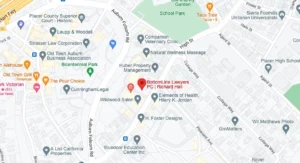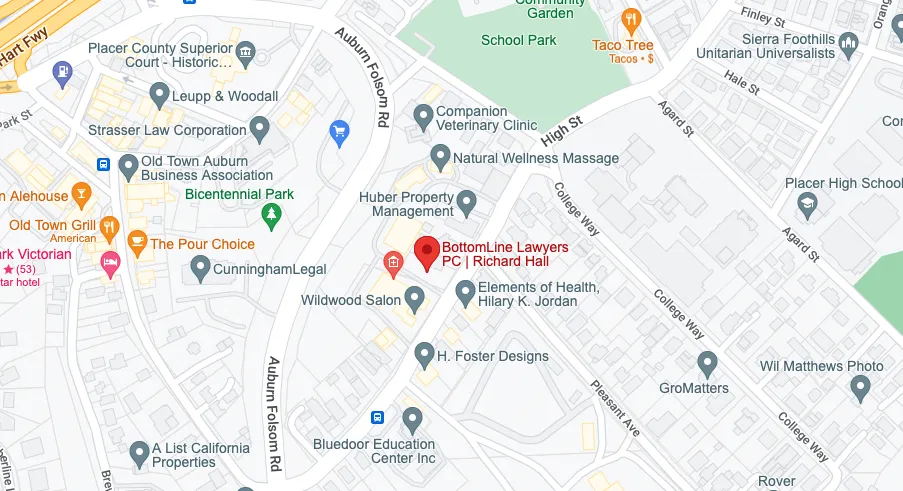Bankruptcy Attorney in Nevada County, CA
 If you are currently dealing with insurmountable debt, that’s normal. We all experience financial distress at least once in our lives. The great news is it’s now easier to deal with debt problems than you might think. Aside from freeing yourself from debt collectors, you can also get rid of late fees, lower interest rates, and get ample time to pay. Sometimes, you may be able to settle your debts for less than the full amount and rebuild your credit score. If this is what exactly you want, consulting with an experienced bankruptcy attorney can help you.
If you are currently dealing with insurmountable debt, that’s normal. We all experience financial distress at least once in our lives. The great news is it’s now easier to deal with debt problems than you might think. Aside from freeing yourself from debt collectors, you can also get rid of late fees, lower interest rates, and get ample time to pay. Sometimes, you may be able to settle your debts for less than the full amount and rebuild your credit score. If this is what exactly you want, consulting with an experienced bankruptcy attorney can help you.
Bottomline Lawyers provides a comprehensive analysis of your debt issues, whether Chapter 7 or 11 bankruptcy or even automatic stay. Our law firm’s founder, Richard Hall, has a unique set of experiences that enable him and our legal team to provide a sophisticated and innovative solution to each client. Using our extensive experience and competence with bankruptcy, we will handle your case with utmost care and diligence. Set a free consultation today!
Why Do I Need a Bankruptcy Attorney in California?
Even though having a bankruptcy lawyer by your side is not required by any bankruptcy law, hiring one can be extremely beneficial. They help you understand your debts, advise you on how you can safeguard your legal rights, and provide wise alternatives to bankruptcy. Before selecting a competent bankruptcy lawyer, take note of these valuable characteristics:
- Strategic Thinker – Bankruptcy laws are intrinsically complicated, and dealing with the bankruptcy trustee requires an effective strategy. Your bankruptcy attorney should be cunning and quick to provide legal aid. Not only to have your bankruptcy petition granted, but also to prevent future conflicts.
- Unique Experience – While extensive years of experience are crucial, have you ever considered what type of experience a bankruptcy lawyer has? Pick someone with relevant business and management experience in addition to bankruptcy law practice.
- Authentic Generosity – You can sense the bankruptcy firm’s principles by looking at its desire to assist those in need. You can determine the genuineness of their generosity by examining their track records. Select someone committed to helping you wipe out your debts and get back on track.
Richard Hall has over 30 years of legal experience and prior business experience before being admitted to the Federal Bar in 1989. This enables him to quickly resolve complex civil trials and gain an advantage when working with various business clients. Richard Hall has enjoyed serving others since he was young. His extensive legal knowledge will undoubtedly assist you in developing a strategic plan to file your bankruptcy petition.
Secured and Unsecured Debts
Debts are legally classified into two types: secured debts and unsecured debts. Before you can start prioritizing your debt, you must first understand the distinction between the two. You must also remember the consequences of failing to pay secured debts are not the same as those of failing to pay unsecured debts. Hence, knowing the distinction between the two debt types is very critical.
Secured Debts
A secured debt pertains to a specific item of property, otherwise known as “security” or “collateral,” which ensures payment of the debt. If you do not pay these debts, the creditor can legally seize the property as collateral without needing to sue you before the bankruptcy court. The creditor is also allowed to sue you even without prior notice. If your car has been repossessed after failing to make necessary loan payments, you might probably be aware of how secured debts work. Below are some examples:
- Home Equity Loans or Mortgages – If you purchased real estate with a mortgage loan, it will typically serve as your security for the loan. If you fail to pay, the creditor will seize your property. Even if you used the money for something other than your home, the creditor could still foreclose on your home equity loan.
- Card Loans – When you apply for a vehicle loan, you automatically agree to put your vehicle under security. If you cannot pay, the creditor can legally repossess your vehicle.
- Store Charges – When you purchase large-scale appliances or furniture using a credit card, you also agree that the item you purchased will serve as security. In cases when you cannot pay the loan, the seller can take the property. However, some store purchases are unsecured. Always check your receipt or credit agreement to see if your purchase is secured or unsecured. Regardless if the debt is secured, you are not required to allow the creditor to enter your home unless the latter is served with a valid court order. In other words, if you keep the property inside your house, you have a tiny chance of losing it.
- Personal Loans – As security, debtors may promise personal property such as electronics, furniture, or other types of equipment. Certain types of creditors are permitted by federal law to use household goods as collateral, such as televisions, jewelry, or appliances, when the items purchased used credit extended to the buyer. Creditors may also secure the debt by filing a lien against your property. However, this only happens in certain circumstances where the law explicitly allows it.
Unsecured Debts
Unsecured debts are those that can’t be secured by collateral. For instance, if you purchased clothes with your credit card, the clothes will not be covered by collateral. If you fail to make the payment, your bank service provider may sue you to recover the amount owed. Unsecured debt includes but is not limited to:
- Cash advances and credit card bills
- Charges on a department store card and gasoline unless your agreement entails a security agreement otherwise
- Loans from family members and friends
- Student loan debt
- Child support and alimony
- Dental, legal, and medical bills
- Utility bills
- Rent
- Synagogue or church dues
- Union dues
Chapter 7 vs. Chapter 11 Bankruptcy: Key Differences
Chapter 11 is typically used by businesses seeking debt relief. It enables the companies to maintain their operations while simultaneously restructuring their business and making payments according to the reorganization plan.
In a Chapter 7 bankruptcy, a reorganization plan does not exist. Rather, debtors can retain exempt assets and liquidate the non-exempt assets to pay the creditors. Chapter 7 bankruptcy is normally used by people seeking a fresh start, while Chapter 11 bankruptcy is used by businesses to continue their operation while settling their debts.
Moreover, Chapter 7 is much quicker than Chapter 11 bankruptcy.
Call our Nevada County Bankruptcy Attorney Now!
 Today, Nevada City is well-known for its vibrant and enjoyable street festivals. The gateway to Tahoe National Forest has a lot to offer too! You can go camping, fishing, hiking, kayaking, mountain biking, or even play golf. Your weekend in Nevada County will never be enough with its endless exciting activities. However, unwinding in the city while carrying financial problems prevents you from having fun. You are not alone in this battle – contacting a reliable bankruptcy law firm can help you obtain debt relief!
Today, Nevada City is well-known for its vibrant and enjoyable street festivals. The gateway to Tahoe National Forest has a lot to offer too! You can go camping, fishing, hiking, kayaking, mountain biking, or even play golf. Your weekend in Nevada County will never be enough with its endless exciting activities. However, unwinding in the city while carrying financial problems prevents you from having fun. You are not alone in this battle – contacting a reliable bankruptcy law firm can help you obtain debt relief!
Bottomline Lawyers is a trusted bankruptcy firm that can help you file for bankruptcy. Seeking legal help is always encouraged because bankruptcy rules are very stressful, especially when you are new to legal terminology. Dealing with debt can be frustrating, in addition to handling every bankruptcy procedure alone.
Besides Chapter 7 and Chapter 11 bankruptcy, we also handle LGBTQ+ Bankruptcy, Business Formation & Counseling Attorneys, Estate Planning, and Tax Resolution. Our legal team will help you secure your financial future; so you can become totally debt free. Call us and file bankruptcy today!
To get to Bottomline Lawyers from Nevada:
- Take Chukar Dr to McCourtney Rd
- Continue on McCourtney Rd. Take CA-49 S to High St in Auburn


